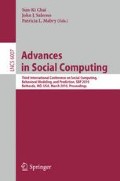Abstract
When prices depend on the submitted bids, i.e. with endogenous market-clearing prices in repeated-round auction mechanisms, the assumption of independent private values that underlines the property of incentive-compatibility is to be brought into question; even if these mechanisms provide active involvement and market learning. In its orthodox view, adaptive bidding behavior imperils incentive-compatibility. We relax the assumption of private values’ independence in the repeated-round auctions, when the market-clearing prices are made public at the end of each round. Instead of using game-theory learning models, we introduce a behavioral model that shows that bidders bid according to the anchoring-and-adjustment heuristic, which neither ignores the rationality and incentive-compatibility constraints, nor rejects the posted prices issued from others’ bids. Bidders simply weight information at their disposal and adjust their discovered value using reference points encoded in the sequential price weighting function. Our model says that bidders and offerers are sincere boundedly rational utility maximizers. It lies between evolutionary dynamics and adaptive heuristics and we model the concept of inertia as high weighting of the anchor, which stands for truthful bidding and high regard to freshly discovered preferences. Adjustment means adaptive rule based on adaptation of the reference point in the direction of the posted price. It helps a bidder to maximize her expected payoff, which is after all the only purpose that matters to rationality. The two components simply suggest that sincere bidders are boundedly rational. Furthermore, by deviating from their anchor in the direction of the public signal, bidders operate in a correlated equilibrium. The correlation between bids comes from the commonly observed history of play and each bidder’s actions are determined by the history. Bidders are sincere if they have limited memory and confine their reference point adaptation to their anchor and the latest posted price. S-shaped weighting mechanism reflects such a bidding strategy.
Access this chapter
Tax calculation will be finalised at checkout
Purchases are for personal use only
Author information
Authors and Affiliations
Editor information
Editors and Affiliations
Rights and permissions
Copyright information
© 2010 Springer-Verlag Berlin Heidelberg
About this paper
Cite this paper
Dragicevic, A.Z. (2010). Endogenous Market-Clearing Prices and Reference Point Adaptation. In: Chai, SK., Salerno, J.J., Mabry, P.L. (eds) Advances in Social Computing. SBP 2010. Lecture Notes in Computer Science, vol 6007. Springer, Berlin, Heidelberg. https://doi.org/10.1007/978-3-642-12079-4_2
Download citation
DOI: https://doi.org/10.1007/978-3-642-12079-4_2
Publisher Name: Springer, Berlin, Heidelberg
Print ISBN: 978-3-642-12078-7
Online ISBN: 978-3-642-12079-4
eBook Packages: Computer ScienceComputer Science (R0)

